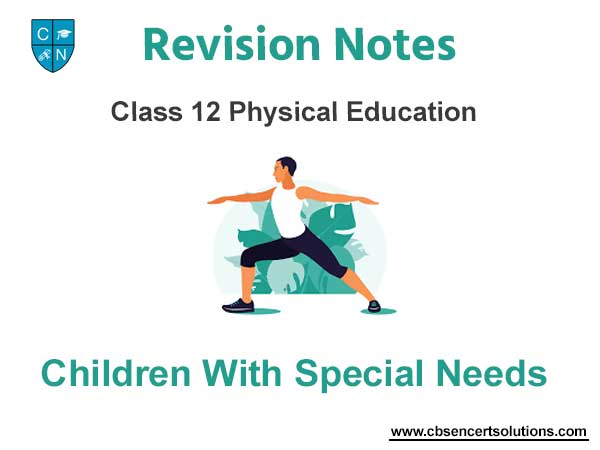Please refer to Chapter 4 Children with Special Needs Notes Class 12 Physical Education and questions with solutions below. These revision notes and important examination questions have been prepared based on the latest Physical Education books for Class 12. You can go through the questions and solutions below which will help you to get better marks in your examinations. You can refer to Class 12 Physical Education Notes provided by us for all chapters in your NCERT Book for Class 12 Physical Education.
Class 12 Physical Education Notes Chapter 4 Children with Special Needs
Concept of Disability and Disorder
When a person is rendered unfit to do a particular type of work, it is his condition of disability. This kind of disability may be due to any disease or accidental or congenital (from birth). Many children are handicapped and because of which their physical capacity decreases. A physically defective child should be treated in the same way as a normal child in family and school. He should be provided with all possible facilities and services. The members of the family or teachers in school should not look upon such a child as inferior to other children.
Meaning of Disability:
Disability is an impairment that may be cognitive, development, intellectual, mental, physical, etc. It affects the everyday activities of the individual to a considerable amount. It may be present in an individual from birth or occur during one’s lifetime.
“A disability is a functional limitation or restriction of individual’s ability to perform an activity.”
According to W.H.O., “A disability is a restriction or lack (resulting from impairment) of ability to perform an activity in the manner or within the range considered normal for a human being.”
Meaning of Disorder:
Disorder is usually used for mental disabilities. Disorder is any ailment that disturbs the health of an individual. Generally, disorder disrupts the normal functioning of an individual. It can be defined as blip (malfunction) in the usual functioning of a person.
Types of Disability, its Causes and Nature (Cognitive, Intellectual and Physical Disability)
Types of Disability:
Disability occurs to individuals in many ways and with varied severity. Some individuals are disabled right at birth while other individuals get disabled owing to some events during the course of their lives.
Mainly, there are three types of disabilities such as:
- Cognitive Disability: The word ‘cognitive’ is related to the area of mental functions dealing with logic, the processing of information received by the various sensory organs. Indeed, it is a neurological disorder that creates hindrance or obstruction for an individual to store, process and produce information. This ability can affect an individual’s ability to read, compute, speak and write. So, these types of disability can also be called invisible disability because unlike other disabilities, you may not be able to assess the condition by just looking at the individual.
Generally, the individuals who have these types of disability usually have following symptoms.
a. Memory Disorder: Impairment in storage, retention or recollection of information or difficulty in remembering something that he or she heard.
b. Hyperactivity: Inability to maintain focus and attention for a long period. They usually lose concentration frequently.
c. Dyslexia: Learning disability in reading which leads to inability to write, read and speak accurately. .
- Intellectual Disability: Intellectual disability is a disability characterized by significant limitations in both intellectual functioning (reasoning, learning, problem solving) and in adaptive behavior, which covers many everyday social and practical skills. This disability originates before the age of 18 years.
- Physical Disability: A physical disability is a limitation on an individual’s physical functioning, mobility, dexterity or stamina. Other impairments such as respiratory disorders, blindness, epilepsy and sleep disorders, which limit other facets of daily living, are also included in physical disabilities. Physical disability may either be motor deficiency (motor
impairment) or a sensory impairment. In simple words, a physical disability is one that affects a person’s mobility or dexterity.
Causes of Disability:
1. Genetics causes
2. Poverty
3. Accidents
4. Malnutrition
5. Use of Intoxicants and Drugs
6. Toxic Materials, Pesticides and Insecticides
7. Mental health Problems
8. Infectious Diseases
9. Disturbance in Endocrine Glands
10. Nuclear Accidents
11. Illness
12. Poor Approach to Health Care
Types of Disorder, its causes and nature (ADHD, SPD, ASD, ODD, OCD)
1. Attention Deficit Hyperactivity Disorder (ADHD)
Attention deficit hyperactivity disorder is a group of behavioral symptoms that include inattentiveness, hyper active and impulsiveness. It is a medical condition affecting a person’s ability to focus, sit still, and pay attention. They may have difficulty in focusing on tasks or subjects, or act impulsively; they may also get into trouble. They may be hyperactive or may be unable to control their impulses. This type of disorder is found more common in boys than in girls.

Causes of Attention Deficit Hyperactivity Disorder (ADHD)
- Genetic factor
- Low birth weight
- Lack of discipline in the family
- Brain injuries
- Trauma and brain diseases
- Diet and exposure to toxic substance
2. Sensory Processing Disorder (SPD)
Sensory processing disorder is a condition in which the brain has difficulty in receiving and responding to information that comes in through the senses. In fact, it refers to the way the nervous system receives messages from the senses and then turns them into proper motor and behavioral response. Generally, all the activities such as reading a book or riding a bicycle require accurate processing of sensation. It is some sort of neurological traffic jam that prevents certain parts of the brain from receiving the information required to interpret sensory information accurately.
Sensory processing disorder may affect one sense such as touch, sight, taste or movement. It may also affect multiple senses. The person with SPD may remain unresponsive to anything around him. Even he may fail to give any response to extreme heat or cold or pain.
Causes of Sensory Processing Disorder (SPD)
1. Genetic Cause
2. Low birth weight
3. Environmental Factors
3. Autism Spectrum Disorder (ASD)
Autism spectrum disorder is a disorder that affects development. Here, the word spectrum refers to the range of symptoms and their severity. Generally, the young children with ASD have difficulties with communication, language, social skill and behavior. In other words, autism spectrum disorders are characterized by social interaction difficulties, communication challenges and a tendency to engage in repetitive behaviors. As a matter of fact, children with ASD may behave differently or repeat the same activities again and again like touching the same object repeatedly. However, all the children with ASD don’t have the same problems or behaviors. Usually, the affected children with ASD may show symptoms. They avoid eye contact and prefer to be alone. They don’t like to be embraced and repeat the words and actions. They feel difficulties in expressing their needs and emotions. They are sensitive to taste, smell and sound.
Causes of Autism Spectrum Disorder (ASD)
Research studies show that there is no single cause of this disorder. However, the available data related to this field suggest that this disorder result from different sets of causal factors such as:
1. Genetic Cause
2. Environmental Factors
4. Oppositional Defiant Disorder (ODD)
Oppositional defiant disorder is a set or group of behavioral disorders called disruptive behavior disorders. It is called by this name because children who have these disorders always tend to disrupt those around them. It is one of the most common mental health disorders found in children and adolescents.
Physician defines this disorder as a pattern of disobedient, hostile and defiant behavior directed towards authority figures. The individuals affect by this disorder usually rebel, argue with adults, refuse to obey and are obstinate. The affected children with ODD show various systems. They argue excessively with adult and don’t obey the rules and regulations. They refuse to comply with requests. They deliberately annoy and upset other individual. They also try to blame other individuals for their mistake. They show resentment and have revengeful attitude. They have difficulty in making friends and have low self-esteem. They have negativity in their behaviors. They display angry and irritable moods as well as vindictive behavior.
Causes of Oppositional Defiant Disorder (ODD)
In fact, there is no specific or clear-cut cause of oppositional defiant disorder. It is widely believed that a combination of various factors such as:
1. Biological or genetic factors
2. Psychological factors
3. Physical factors
4. Social factors
5. Obsessive Compulsive Disorder (OCD)
Obsessive compulsive disorder is a mental health disorder that affects people of all ages and walks of life. It is a type of mental disorder that causes repeated unwanted thoughts. To get rid of the unwanted thoughts, he/she performs the same task/activity again and again. For example, a person may fear that everything he/she touches has germs on it. So, to get rid of that fear he/she washes his/her hands again and again. Persons suffering from OCD might understand that their obsessions are unreasonable, but trying to stop or ignore them cause anxiety and stress.
Causes of Obsessive Compulsive Disorder (OCD)
The exact cause of OCD is still unknown. Research studies suggest that there may be a problem with the way one part of the brain sends information to another parts. Serotonin is the chemical in the brain that send message from one part to another. Insufficiency of serotonin may help in causing OCD.
Stress and anxiety do not cause OCD but every day stress and anxiety may worsen the symptoms of OCD. Recent studies have indicated that there may be considerable genetic basis for OCD. Depression is also thought to cause OCD.
Disability Etiquettes
- Always put the people first i.e., say ‘person with disability’ rather than ‘disabled person’.
Always avoid the outdated words like handicapped, retarded, physically challenged or differently abled. For example, refer to ‘person who is blind’ rather than ‘blind person’. - In case of introduction to a person with a disability, it is appropriate to shake hands.
- When you meet a person with a visual impairment, always identity yourself and others who may be with you.
- Always listen carefully as well as attentively when you are having conversation with a person who has difficulty in speaking. Have patience and wait for the person to finish rather than
correcting or speaking for that person. Generally ask short questions that require short answers. - To get the attention of a person who is deaf or having hearing impairment, tap the person on the shoulder or wave your hand. You should look directly at the person and speak cleanly.
- Never patronize person who use wheelchairs by patting them on the head or shoulder.
- Always introduce yourself to persons who are blind using your name.
- If you need to leave a person who is blind, inform him you are leaving and ask him if he needs anything before you leave.
Strategies to make physical activities accessible for children with special needs
Children with special needs or with various types of disabilities such as mental disability, hearing impairment, speech or language impairment, blindness, autism or poor body mechanics, health impairment, etc., have the right to develop their abilities in a democratic society through the process of education.
Following strategies should be taken into consideration to make physical activities accessible for the children with special needs:
- Medical check-up
- Physical activities must be based on interests of children
- Equipment related to physical activities should be according to the needs of children
- Specific environment should be provided
- A variety of different instructional strategies should be used
- Rules should be modified according to the needs of children with disabilities
- Children’s previous experience must be taken into consideration



